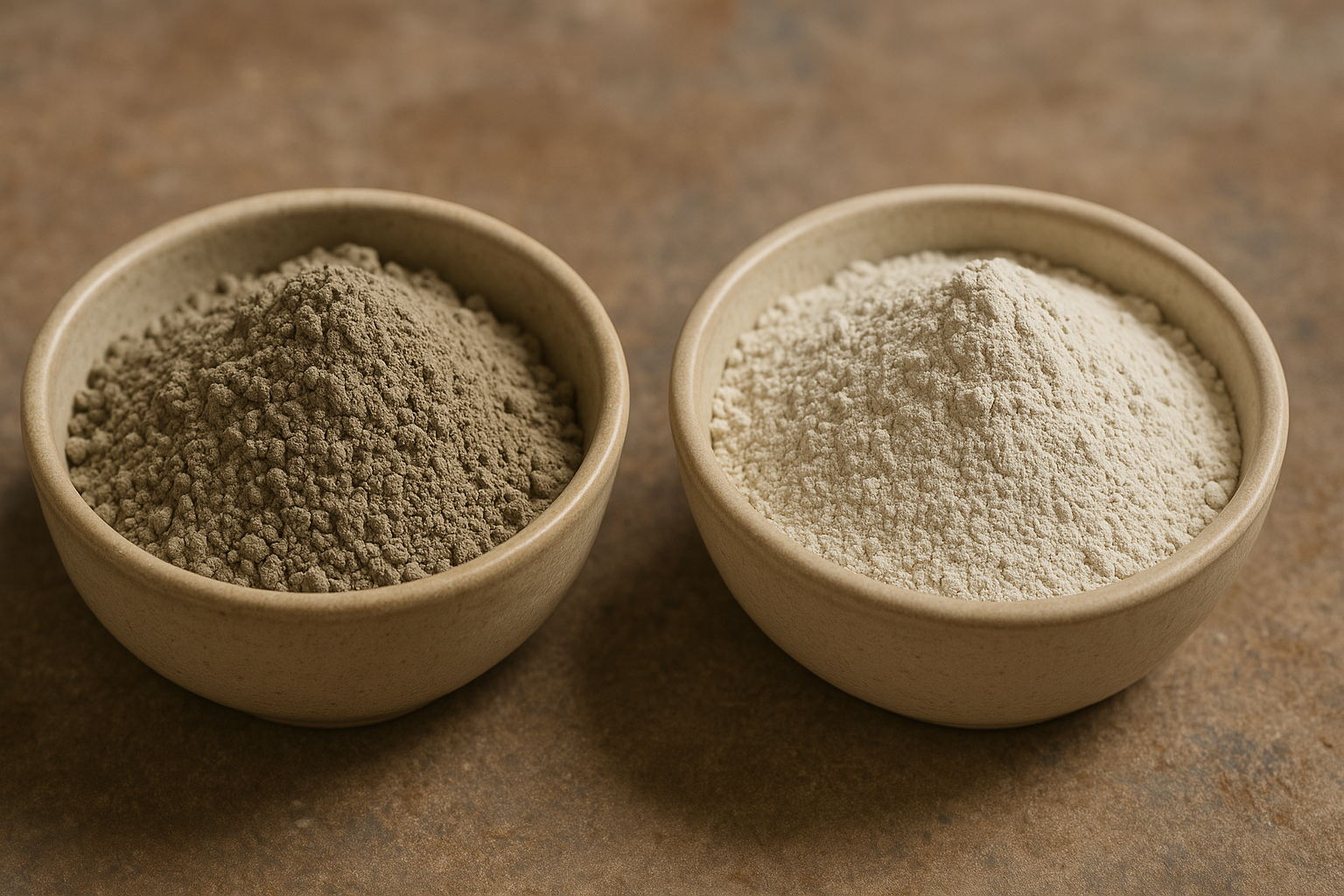When navigating the world of industrial clay minerals, two terms frequently appear that often confuse professionals and consumers alike: bentonite montmorillonite and montmorillonite. While these terms might seem interchangeable, understanding their distinct characteristics, applications, and properties is crucial for making informed decisions in various industries—from construction and drilling to pharmaceuticals and environmental management.
In India’s rapidly growing industrial landscape, where companies like CMS Industries are leading the charge in bentonite manufacturing and export, this knowledge becomes even more valuable. Whether you’re sourcing materials for oil drilling operations, foundry applications, or chemical processing, grasping the nuances between these clay minerals can significantly impact your project’s success and cost-effectiveness.
Understanding Montmorillonite: The Foundation Clay Mineral
Montmorillonite is a specific type of phyllosilicate clay mineral that belongs to the smectite group. Named after the French town of Montmorillon where it was first discovered, this mineral forms through the precipitation from water solutions, creating microscopic crystals that exhibit remarkable properties.
Key Characteristics of Montmorillonite
The molecular structure of montmorillonite consists of two tetrahedral sheets of silica surrounding a central octahedral sheet of alumina. This unique arrangement creates a 2:1 layer structure that gives montmorillonite its distinctive properties:
- Exceptional swelling capacity: Can expand up to eight times its original volume when exposed to water
- High cation exchange capacity: Typically ranging from 80-150 meq/100g
- Fine particle size: Usually less than 0.5 micrometers
- Monoclinic crystal system: Providing structural stability
Industrial Applications of Pure Montmorillonite
Pure montmorillonite finds applications in specialised industries where its specific properties are crucial:
- Pharmaceutical industry: Used as an excipient in drug delivery systems due to its adsorption properties
- Cosmetics: Incorporated in face masks and skincare products for its purifying effects
- Research and development: Utilised in nanotechnology applications
- Environmental remediation: Applied in contaminated soil treatment projects
Bentonite: The Comprehensive Clay Solution
Bentonite, on the other hand, is a broader term referring to a rock formation composed predominantly of montmorillonite but also containing other clay minerals. This distinction is crucial because bentonite’s properties and applications vary significantly based on its montmorillonite content and the presence of other minerals.
Composition and Formation
Bentonite typically contains:
- 70-90% montmorillonite (the primary component)
- Additional clay minerals: Such as illite, kaolinite, and beidellite
- Accessory minerals: Including quartz, feldspar, and calcite
- Exchangeable cations: Primarily sodium, calcium, and magnesium
The formation process involves the weathering of volcanic ash, particularly in marine environments, which explains why major bentonite deposits in India are found in regions like Kutch, Gujarat—where CMS Industries operates its manufacturing facilities.
Types of Bentonite
The classification of bentonite depends on the dominant exchangeable cation:
Sodium Bentonite (Wyoming-type)
- Superior swelling properties
- Excellent suspension characteristics
- Preferred for drilling applications
- High viscosity when mixed with water
Calcium Bentonite
- Limited swelling capacity
- Better thermal stability
- Suitable for foundry applications
- More cost-effective for certain uses
Bentonite Montmorillonite Vs Montmorillonite: The Core Differences
Understanding the bentonite montmorillonite vs montmorillonite distinction requires examining several key factors:
1. Purity and Composition
Montmorillonite represents the pure mineral form with uniform chemical composition and predictable properties. Bentonite montmorillonite, however, refers to the montmorillonite content within bentonite, which typically ranges from 70-90% depending on the source and processing methods.
2. Performance Characteristics
The presence of other minerals in bentonite can either enhance or diminish certain properties:
- Swelling capacity: Pure montmorillonite exhibits maximum swelling, while bentonite’s swelling depends on montmorillonite content
- Thermal stability: Additional minerals in bentonite may improve heat resistance
- Chemical reactivity: Impurities can affect adsorption and ion exchange properties
3. Cost Considerations
Pure montmorillonite commands higher prices due to processing requirements and limited applications. Bentonite offers a more economical solution for most industrial applications while maintaining essential properties.
4. Availability and Sourcing
In India, bentonite is readily available from established manufacturers like CMS Industries, which operates multiple mining locations across Kutch, Gujarat. Pure montmorillonite requires specialised processing and is less commonly available.
Applications: Where Each Material Excels
Bentonite Applications in Indian Industries
Oil and Gas Drilling CMS Industries supplies API-grade bentonite for drilling operations, where the material’s thixotropic properties help maintain borehole stability and carry drill cuttings to the surface.
Foundry Operations The bonding properties of bentonite make it essential for sand casting, providing green strength and thermal stability during metal pouring processes.
Construction and Civil Engineering Bentonite serves as a sealant in construction projects, particularly in waterproofing applications and as a component in concrete additives.
Environmental Applications Used in waste containment systems and groundwater protection due to its low permeability when hydrated.
Montmorillonite-Specific Applications
Advanced Materials Pure montmorillonite is crucial for nanocomposite development and advanced material research.
Pharmaceutical Industry The controlled properties of pure montmorillonite make it suitable for drug delivery systems and medical applications.
Specialised Chemical Processes Industries requiring precise clay mineral properties often specify pure montmorillonite for optimal results.
Quality Factors and Selection Criteria
Evaluating Bentonite Quality
When sourcing bentonite, consider these critical factors:
Montmorillonite Content Higher montmorillonite content generally indicates better performance for swelling-dependent applications.
Cation Exchange Capacity This measurement indicates the material’s ability to exchange ions, crucial for many industrial processes.
Particle Size Distribution Finer particles typically provide better suspension properties and higher surface area.
Moisture Content Proper moisture levels ensure consistent performance and prevent degradation during storage.
Quality Assurance in Indian Manufacturing
Established manufacturers like CMS Industries maintain ISO 9001:2015 certification, ensuring consistent quality through:
- Regular testing of raw materials
- Standardised processing procedures
- Quality control at multiple production stages
- Compliance with international standards
Economic Considerations and Market Trends
Cost-Effectiveness Analysis
The bentonite montmorillonite vs montmorillonite decision often comes down to cost-effectiveness:
Bentonite Advantages
- Lower procurement costs
- Readily available from multiple suppliers
- Established supply chains
- Proven performance in most applications
Montmorillonite Advantages
- Superior performance in specialised applications
- Predictable properties
- Higher purity standards
- Better suited for research and development
Market Dynamics in India
India’s bentonite market benefits from:
- Abundant raw material reserves
- Strategic manufacturing locations near major ports
- Growing demand from oil and gas sector
- Increasing exports to international markets
Companies like CMS Industries, with production capacity exceeding 9,000 metric tonnes monthly, are well-positioned to meet both domestic and international demand.
Future Outlook and Technological Developments
Emerging Applications
Nanotechnology Both bentonite and montmorillonite are finding new applications in nanocomposite materials, offering enhanced properties for automotive and aerospace industries.
Environmental Remediation Advanced treatment of contaminated soils and groundwater is driving demand for high-quality clay minerals.
Renewable Energy Applications in geothermal energy systems and battery technology are expanding the market potential.
Processing Innovations
Modern processing techniques are improving the quality and consistency of both materials:
- Advanced purification methods
- Controlled modification processes
- Enhanced particle size control
- Improved packaging and handling systems
Making the Right Choice: Decision Framework
Application-Specific Selection
Choose Bentonite When:
- Cost-effectiveness is paramount
- Standard industrial applications
- Proven performance is sufficient
- Large volume requirements
- Established supply chains are important
Choose Pure Montmorillonite When:
- Maximum purity is required
- Specialised applications
- Research and development projects
- Regulatory compliance demands specific mineral content
- Performance consistency is critical
Working with Reliable Suppliers
Selecting the right supplier is crucial for successful outcomes. Consider factors such as:
- Manufacturing capacity and reliability
- Quality certifications and standards
- Technical support capabilities
- Logistics and delivery networks
- Competitive pricing structures
Conclusion
The distinction between bentonite montmorillonite and montmorillonite may seem subtle, but it carries significant implications for industrial applications, cost considerations, and performance outcomes. While montmorillonite represents the pure mineral form with predictable properties, bentonite offers a practical, cost-effective solution for most industrial needs while maintaining essential characteristics.
For Indian industries, the choice often favours bentonite due to its availability, proven performance, and economic advantages. Companies like CMS Industries, with their strategic locations, substantial production capacity, and commitment to quality, provide reliable access to high-grade bentonite products that meet diverse industrial requirements.
Understanding these differences empowers you to make informed decisions that optimise both performance and cost-effectiveness in your specific applications. Whether you’re involved in oil drilling, foundry operations, construction, or environmental management, the right choice between these materials can significantly impact your project’s success.
Ready to source high-quality bentonite for your industrial applications? Contact CMS Industries today to discuss your specific requirements and discover how their expertise in bentonite manufacturing can support your business objectives.
Frequently Asked Questions
Q1: What is the main difference between bentonite and montmorillonite?
Montmorillonite is a specific clay mineral, while bentonite is a rock composed primarily of montmorillonite (70-90%) plus other clay minerals and impurities.
Q2: Which is more cost-effective for industrial applications?
Bentonite is generally more cost-effective for most industrial applications, offering good performance at lower costs compared to pure montmorillonite.
Q3: Can bentonite and montmorillonite be used interchangeably?
For most industrial applications, bentonite can substitute montmorillonite. However, specialised applications requiring high purity may specifically need pure montmorillonite.
Q4: How does montmorillonite content affect bentonite quality?
Higher montmorillonite content generally improves bentonite’s swelling capacity, cation exchange ability, and overall performance in applications requiring these properties.
Q5: Which material is more readily available in India?
Bentonite is more readily available in India, with established manufacturers like CMS Industries producing thousands of metric tonnes monthly from Gujarat’s rich deposits.







